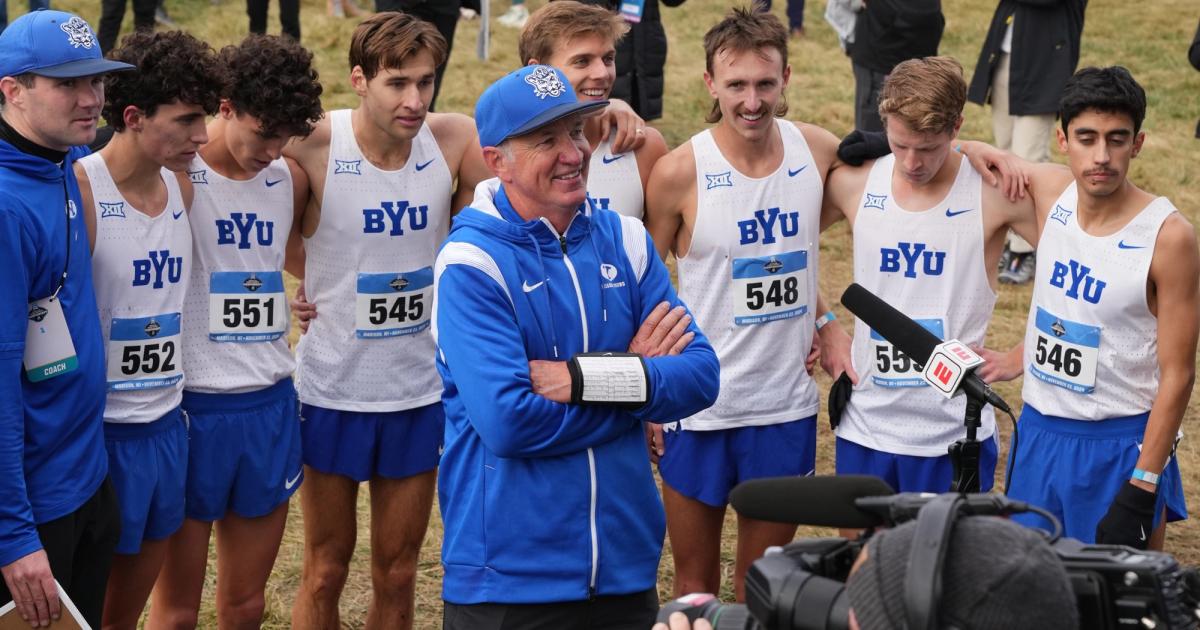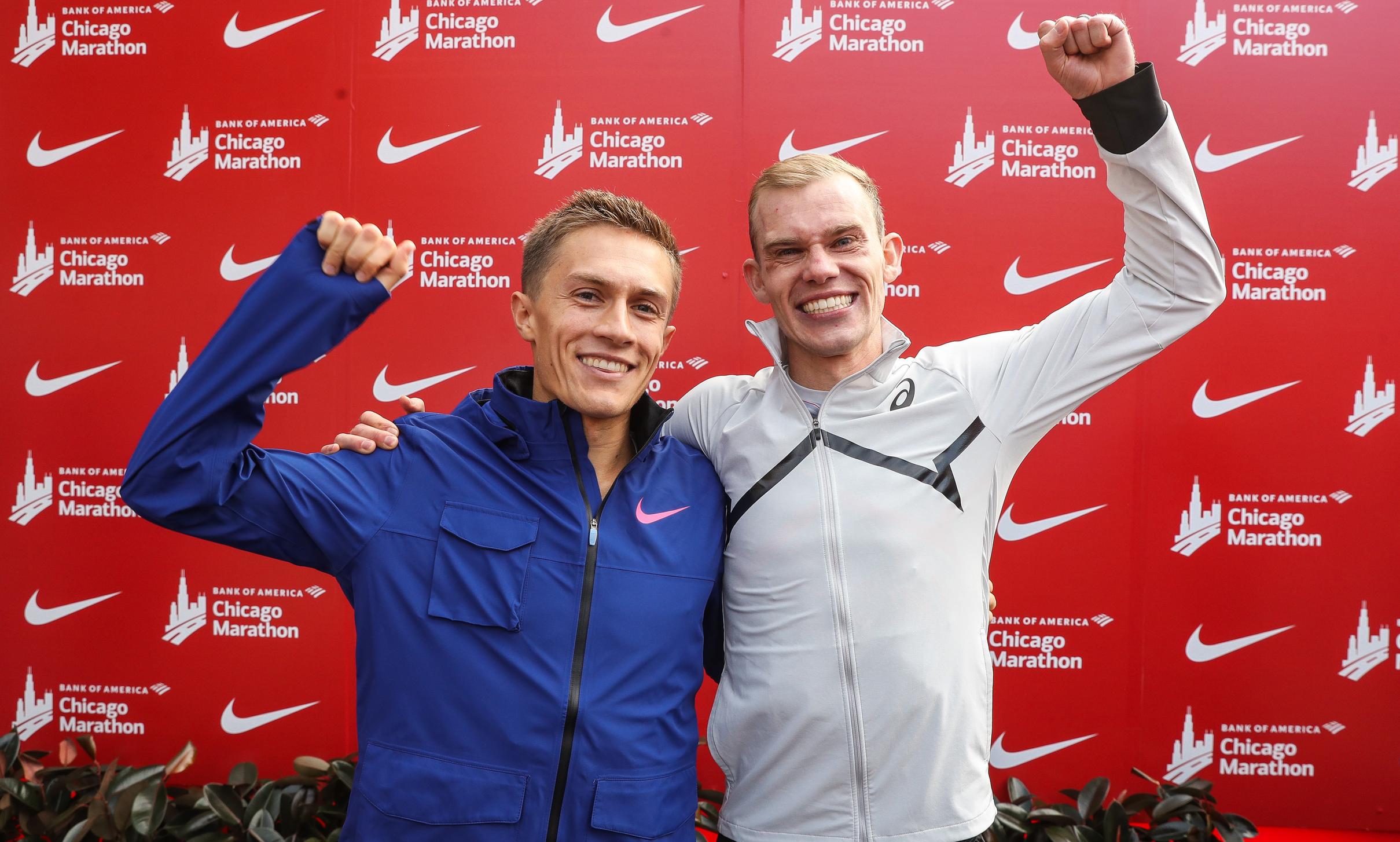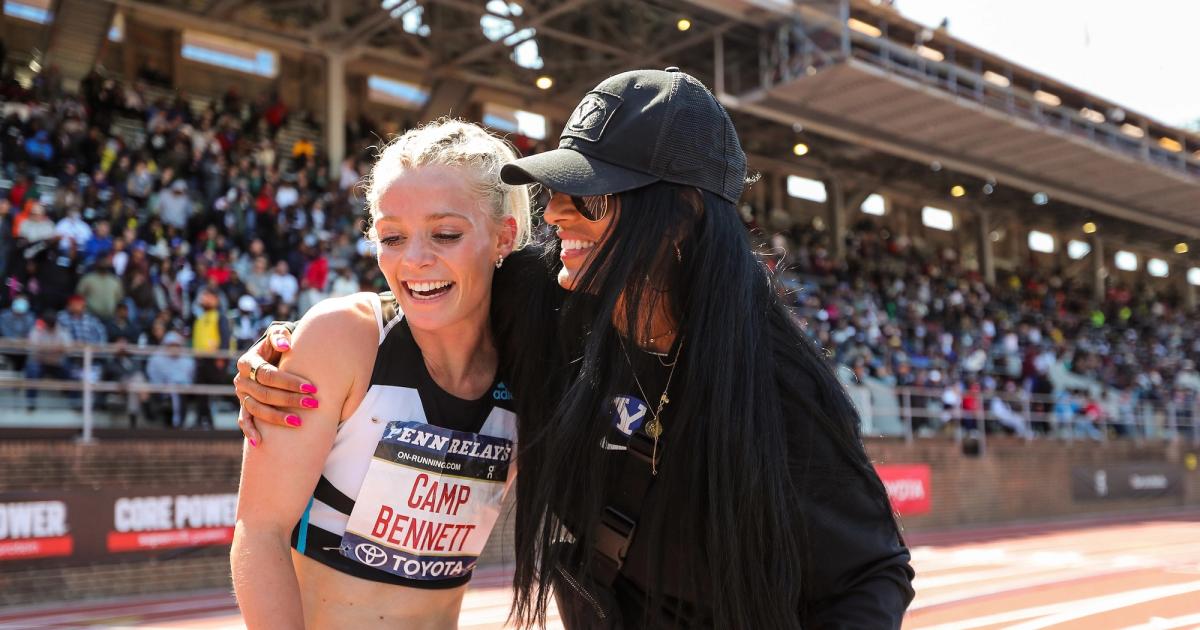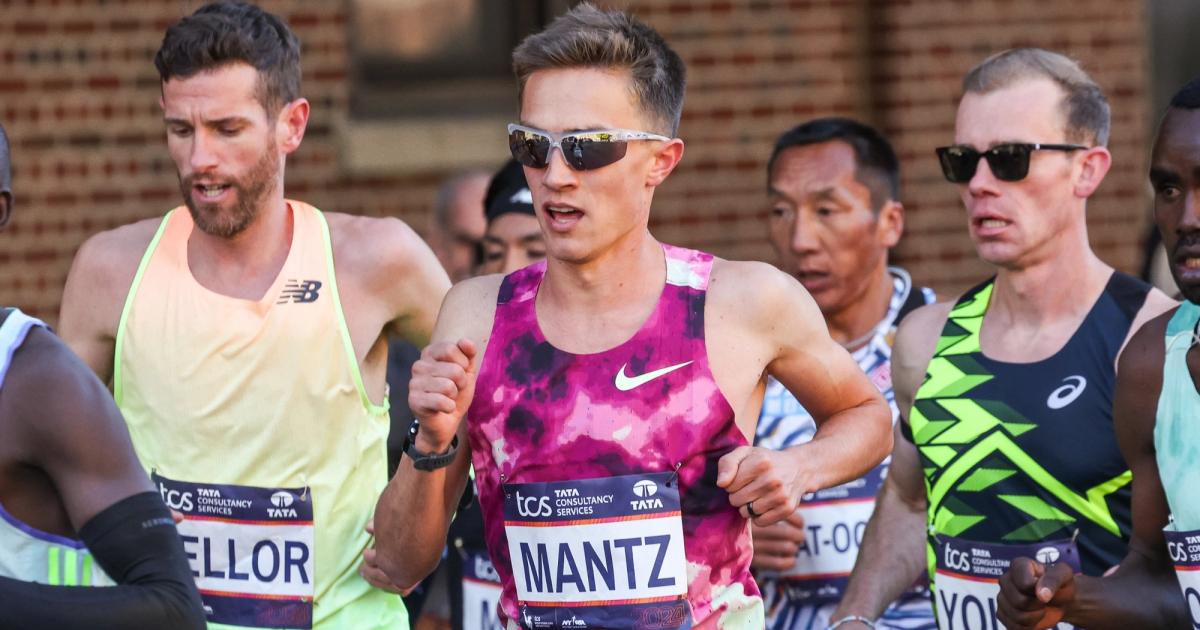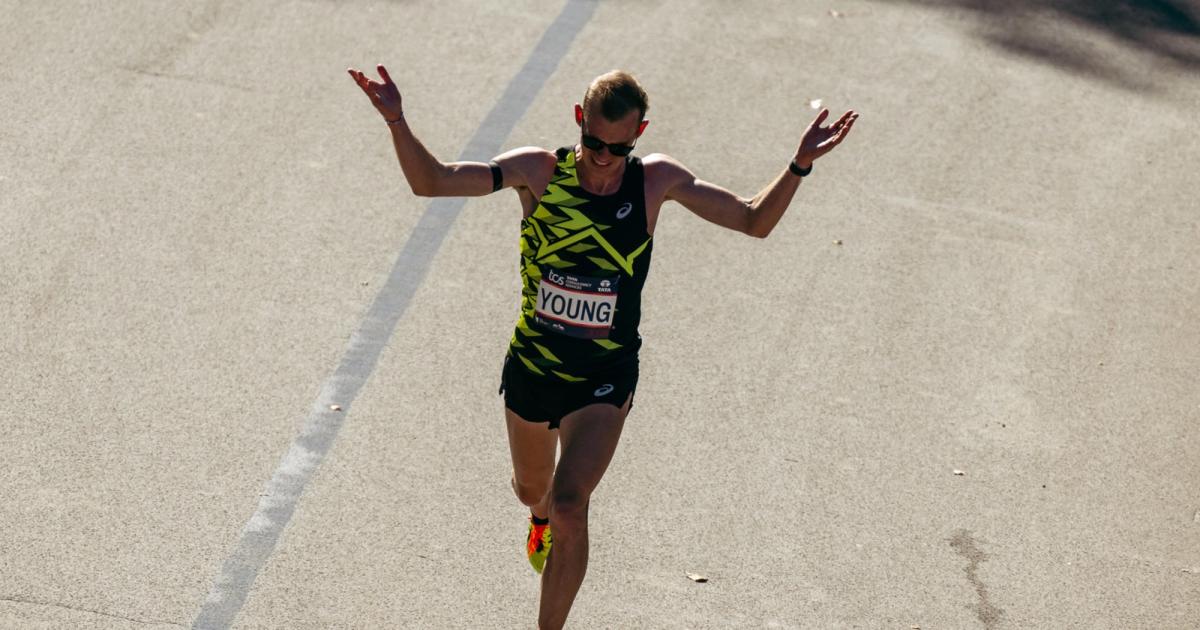November 26, 2024
Listen
"What was special about 2024? Who knows other than having the right athletes in the right position, the right belief and faith in their parts and goals, and going, ‘Hey, maybe we can do this.’"
My guest for today’s episode is BYU director of track and field and cross country Ed Eyestone, the architect of one of the greatest years ever for American distance running.
From Olympic medals and top-10 marathon finishes to NCAA titles, 2024 was nothing short of historic for Coach Eyestone and his athletes. Just this weekend, Ed capped it all off by leading the BYU men to their second NCAA cross country title in six years, holding off a stacked field at the Thomas Zimmer Championship Course. It’s been a dream season for Eyestone, whose year began with Conner Mantz and Clayton Young finishing 1-2 at the Olympic Marathon Trials and ended with BYU completing a historic NCAA sweep—both the men’s and women’s teams claiming national titles for the first time since 2004.
We dive into Ed’s coaching strategies, his reflections on this monumental season and how he’s built a culture of resilience and excellence at BYU. From the roads to the track to the grass, no one’s had a better 2024 than Ed Eyestone, and we can’t wait to hear his take on how it all came together.
Host: Chris Chavez | @chris_j_chavez on Instagram
Guest: Ed Eyestone | @edeyestone on Instagram
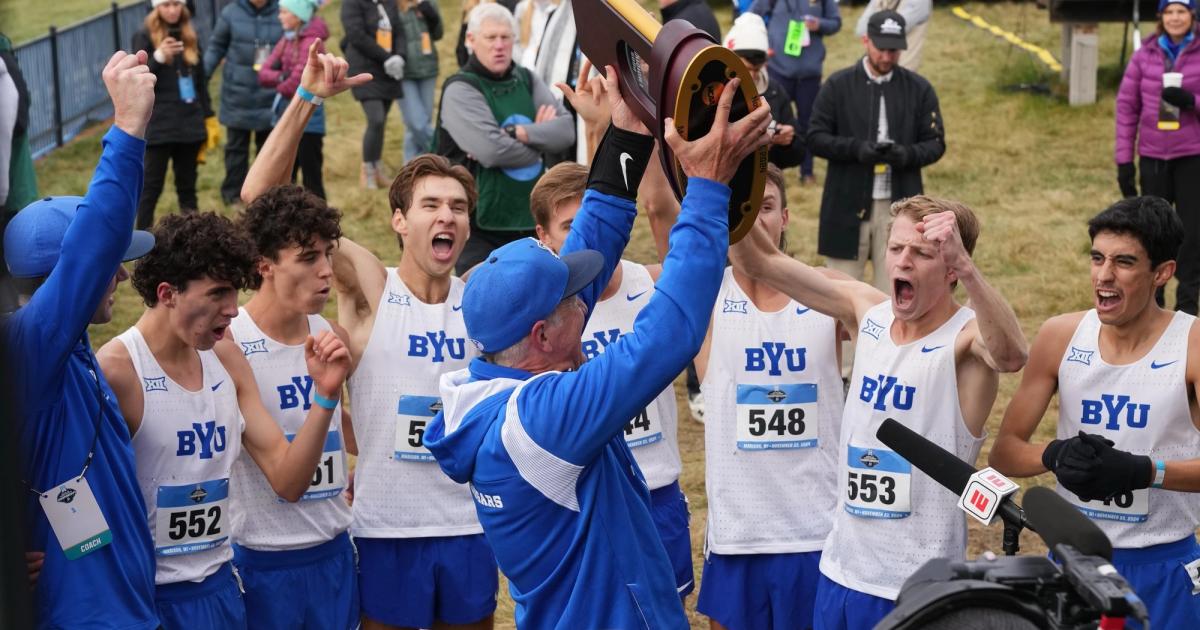
Mac Fleet / @macfleet
The following interview has been edited lightly for length and clarity. You can listen to the full interview with Ed Eyestone on the CITIUS MAG Podcast – available on Apple Podcasts, Spotify or wherever you get your shows.
Chris Chavez: What’s it like being back to work on a Monday after winning the NCAA Cross Country Championship? What’s your day been like today?
Ed Eyestone: We have a really good broadcast system at BYU, a broadcast team. They had us on for their Sports Nation, which is kind of a countrywide program that goes out on KBYU. It was fun. The women’s team was there, and they had a 15-minute segment. I was there with three of my athletes, and we had a 15-minute segment as well.
We’ve been scheduling a lot of celebrations, as we should when you win a national championship, and I’ve been taking a lot of congratulatory calls. My phone, after the race and throughout Sunday, had literally hundreds of messages from good friends—some of whom I hadn’t talked to since the last big thing happened. It’s really nice. You realize how much love, support, and following you have in times like this.
Sometimes, you wish you had that same kind of love and support when things don’t go so well. As a coach, you’re never going to be 100% on it every year. But this has been a good year for BYU cross country and BYU track and field in general. This was a nice way to cap an amazing 2024.
It’s been 48 hours since the race, yet you just held up your phone and the results page is right in front of you. How have the feelings been processing winning another national title over the last 48 hours? And how much have you been looking at those results?
Certainly gratitude—gratitude that we were able to pull it off, and gratitude and admiration for my team. They showed incredible poise with the way things sorted out.
It just goes to show that sometimes you have a less-than-perfect day, but things still turn out okay. That begins and ends with the depth and build of your team to weather these imperfect days.
Going into it, I thought we needed to hit it out of the park and maybe rely on some hiccups from other teams to win it. In hindsight, had we hit on all cylinders, I think we could have been in the 60s or 70s [for points], and the lead could have been much larger. But the same could be said for teams like Oklahoma State, Iowa State, or Wake Forest. Rarely does everything go perfect, so hopefully you have the build and the determination to withstand those imperfections and still end up on the podium.
What stood out to you about how the race unfolded? What were your final instructions to the guys about the team race plan?
Our game plan was pretty simple. Casey Clinger goes out battling for a top-10 [spot], which we assumed to be a breakaway pack. For our runners two through seven, I felt that, on any given day, they could finish anywhere from low-20s to mid-30s. My hope was to have seven All-Americans.
Before the season, I had seven guys in my office saying their goals were to be All-Americans. I didn’t discourage any of them because I felt they had the credentials and track chops to merit that goal.
The plan was for Casey to battle up front, and the rest of the guys to pack it up. But [as they say], 'Once you engage with the enemy, plans go out the window...' We were on the outside and got off to a really good start. I don't know if it was the weather, or just the personality of the race, but the race didn’t go out very hard. My guys were on the outside; they had a straight shot, they ran the tangents. I don't know if they ran any harder than usual, but the vast majority of the pack settled in, and suddenly, after the first 1K or 2K split, we saw our score was in the 40s.
I was a little concerned when I saw my 1500 meter runner, Lucas Bons, up with the leaders. He’s a 3:35 guy, so he’s got some wheels. On a moderate early pace, it’s easier for him to stay up front.
Suddenly, we had five or six guys in the top 40 early on. As a result, we had a very low score and a big lead. I told people on Sports Nation this morning it was like having a four-touchdown lead in the first quarter. It’s exciting as a coach, but you also realize that if things go south on you, if you don’t hold on to that lead, it's really bad.
The pace was moderate enough that my guys didn’t have to tap too far into their resources. They held it together and showed poise. We communicated with them the best we could using a whiteboard. After 4K, we put up a number of +40 or +50 to let them know they had a cushion. It was just about holding it to the line.
Where did the idea for the whiteboard come from? I feel like next year in Missouri [for the 2025 NCAA Cross Country Championships], you're going to have so many whiteboards out there.
Maybe we shouldn’t be so free about sharing it! It actually stems back to when I ran in the Olympics in 1992, in Barcelona. Late in the race, someone had a board—not a whiteboard, just a handmade board—showing places as you passed by. I shared that story with my marathoners in Paris this year.
We had enough volunteers there to do the same thing, giving Conner Mantz and Clayton Young information about how many seconds back they were and what place they were in. Information is power. The more you can provide, the better. I think it helped marginally at the Olympics, but in a cross country race like this, it’s even more so.
After the race, I asked the guys about it. They said they didn’t see the whiteboard every time, but they saw it enough to know they had a lead and needed to protect it.
The other thing people have gravitated towards from this weekend is the story about coating the guys in olive oil before the race. Did that also come from your own racing experience?
That’s old school—real old school. Back in 1984, which is incredible to think that was 40 years ago... We used olive oil at Penn State University during a cold day with a little skiff of snow. I had used it at some World Cross championships before. It was our go-to.
Back then, we didn’t have high-tech gear like arm sleeves or tights. The first arm sleeves were basically tube socks with the toes cut out. It gives you a little extra layer of insulation. You wouldn’t want to run a marathon coated in it, but for a 5K and 10K it works. Plus, you look cool—like a bodybuilder—glistening as you cross the line, smelling like a pizza as you come through.
The guys wanted it... We used it at regionals when it snowed and they ran well. It became a little pre-race ritual.
The affirmations on the note card strapped to your wrist. When did you start doing that?
[It came from] Bobby Lowe, our sports psychologist. Bobby was an NCAA pole vaulter in 2005 before earning his Ph.D. in sports psychology. This was his first year working with us.
We meet with him every couple of weeks, and he goes over the importance of power statements and being positive... With seven guys and three or four affirmations each, there’s no way I could remember 28 things. So my assistant, Ryan Waite, ordered quarterback-style cheat sheets. At first, I thought it looked a little hokey, but I went with it.
Do the guys always hear them when they pass by? Probably not. But I think there was enough positive interchange and communication that they occasionally would hear what they wanted to hear and it made us feel like we were doing some sort of job.
At the Big 12 meet, we got some good-natured ribbing about it, but it is what it is. We're not trying to start a trend—we're just trying to get our job done and continue to be relevant.
This is the first time since 2004 that a school has swept both team titles. Obviously, these are separate programs, with Coach Taylor leading the women's side and you quarterbacking the men's side. A lot has to align for that to happen.
When we look at the blueprint of how these teams came together over the years, what similarities jump out to you about how the teams are run and the athletes you’ve recruited to BYU?
The similarities start with the head coaches of each program. We're very competitive and we have different styles. Coach Taylor knows her X's and O's very well. She knows how to get her women prepared physically and mentally. She knows what to do to get them in that place. I feel like I’m pretty good at that as well, based on my years of experience as an athlete and a coach.
We also want to win badly. We want to win well and in a good manner. When we come up short, we want to improve. Coach Taylor is an excellent recruiter, and we've tried to bring the best people to the university that are a good fit.
We acknowledge BYU is not for everybody, or they think it's not for everybody. Usually when we get them on campus and they realize that it's different from what they'd been led to believe, then they immediately fall in love with it.
We're surrounded by some amazing people, amazing support, amazing teammates. I think it's just a matter of giving BYU a shot. We have a strict honor code and that's different than a lot of college experiences. But I think people find that it's not like we're walking around feeling 'holier than thou.' It's just that we are sponsored by the Church of Jesus Christ of Latter-Day Saints, so we adhere to the honor code that the faith has.
It's amazing because I've had a lot of good individuals who are great fits here who are not members of that particular faith who have have felt like they are able to avoid a lot of distractions coming into this culture.
Coach Taylor has her own culture, we have our own culture, but the culture that we have built is one of acceptance, support, hard work and consistency. I think people are seeing that if you get in the right system without distractions and get consistency, then you're going to get good results on the backside. I think our Olympian showed that this year.
I think our teams over the last 8 to 10 years particularly have put ourselves in positions to to be in good places. We're at altitude and that helps too. There's no doubt that one of the reasons why I chose BYU out of high school was I wanted to stay at altitude. I grew up north of here about 60 or 70 miles. It's just a good place, good team spirit, and good team atmosphere.
You’re in line for "Coach of the Year" honors across the board. There's the success with the cross country team, there’s Conner and Clayton’s success, along with some of the other BYU-turned-pros over the past few months. What’s the secret to everything clicking this year?
We recruited them a while ago. And as people notice, our guys between high school and coming to college take a two-year hiatus from the sport. There'll always be groups of individuals who say, 'That's one of your secret sauces. They're a couple of years older.' That's fine to believe that.
I was one of those guys knocking on doors for two years. I know that that two years of essentially no running was not a huge advantage when I got back. It took me a while to get back in shape, but I was a couple of years older. We work with that and they know that we know how to figure that out.
But the main secret sauce is just coming together in a culture of support and in a culture of a program that has produced good results for the 25 years that I've been here. I think we've had pretty solid results. You put the talent in that, then you work them hard, and you try to keep them healthy. My main part of my job is trying not to break people and doing enough so that they can get the work they need, but then factor in the recovery necessary and then do it on the cycle that we do. We do it in six days and we take Sunday off. Part of that's because of the faith that most of the members of the team are part of but also partly just because I found that it works.
I had no qualms back in the day racing on Sunday. That was a necessary evil, so to speak, of being a professional athlete. But I did feel like taking a day off gave me a nice break to my week. I'd work really hard and I'd run 120 miles on six days and then would stay in bed most the day on Sunday. The day of rest. I think that added longevity to my career. When I saw that it worked for me, then I felt like, 'Why shouldn't that work for others?'
The only magic thing about running is consistency. Consistent competence equals eventual excellence. That's kind of my mantra. So we try to stay healthy so that we can be consistent. We just keep on getting the miles in, getting the workouts in, and over time, good things happen. What was special about 2024? Who knows other than having the right athletes in the right position, the right belief and faith in their parts and goals, and going, ‘Hey, maybe we can do this.’
We had surprises along the way. We saw the heroic-type performances, if I may be so bold, by Kenneth Rooks when he took the lead late in the steeplechase [at the Paris Olympics]. I think we all fell out of our chairs. When you have a teammate that you've been working with for the last four or five years, what does that do to you in terms of the belief that, 'If he can do that, why can't I?'...
It's good hard work and some good mentoring from past teammates and hopefully a coach that doesn't have you broken all the time. But people do get broken. And like I said going into the national meet, we had our share of illnesses and aches and pains like everybody else. We're just happy that we were able to pull it off.
What ultimately brings you satisfaction as a coach when you're dealing with so many people at various different stages of where they are in their running career?
You're setting goals with people, you're working towards those, and you want to see them do the very best they can. Hopefully there's an upward trend in the goals and they're not constantly getting broken. I guess the satisfaction just comes from knowing that people go into events feeling well-prepared and that they make it to the starting line. That's half the battle, so I'm always happy when that has occurred. Then you get an opportunity to just go out and perform your best.
Once again, it comes down to process rather than product. If you can just enjoy the process, embrace the process, then that takes a lot of the pressure off as well because you go in and be like 'Okay, I don't have to win.' You control the controllables by focusing on the process? Instead of saying, 'We've got to win this thing, we just say, 'Okay, we're going to get out well because that's what we do. We're going to battle in the middle of it because that's what we do. We're going to pack it up as best we can because that's what we do. All of these things are process statements.
Then I'm going to win my race over the last 2K. I'm going to finish strong and win my race. That's identifying the race that you're in, whether it's in the top five or racing for 15th place. Wherever you are, win that race, beat those guys that are around you. All of those things are process sort of situations and decisions that you're making.
Casey has been a part of many iterations of this team. How have you seen him evolve as a leader in those eight years and change?
He's always been good. As a freshman, I think he was our first our first guy home at NCAAs in whatever his freshman semester was. He went one semester right out of high school, then he went on his LDS mission for two years in Hokkaido, Japan, up in the northern part of Japan. He was there for two years and then came back just in time to start the winter semester. He redshirted when he first got back for that season.
He came in as a pretty mature two-time NXN champ, I think the very first one that had won it twice. So he came in. He was the Danny Simmons of the day, so to speak. We were happy to get him. He wanted to be part of the team and experience that before going on his mission. Danny chose to go straight out.
When Casey came back, he had another level of maturity. You're out on your own, out of the country having leadership opportunities and doing missionary work, which is a lot of service, a lot of proselytizing, a lot of rejection, and then a lot of growing. You're away from mommy and daddy for the first time, you're in a foreign country for the first time, and trying to live off a budget for the first time and doing all these things.
Having those two years of experience is phenomenal in terms of experience, like being fluent in in Japanese. When he goes out in the business sector, I've got to believe that's going to come in handy. But it's two years away from that competitive grind and the aerobic training that one usually does. There's a certain amount of walking around you do and that can keep you from getting fat. But if you go to Japan, you're not going to put on the pounds like you would in some other parts of the world...
They also get a little perspective on life. They see a lot of the demographics of where they're assigned as a missionary and it's less than what they experienced growing up in a privileged environment. For many of these guys in Utah, they haven't been around the world and seen developing countries and the poverty people live in.
It gives them a great worldview and perspective on life... It's a great experience for the guys. I haven't got to the point where I've discouraged anyone from going who feels like that's their calling. It's nice for them to do that and it's also very nice when they come back and we get them back in shape.
Has your coaching style or approach changed much in the last five years?
It's changed a little bit. This is really the first year that we started doing double thresholds. So many of my guys had read so much about it and were intrigued by it, so it felt like that was the way to go. But you're also walking on a tightrope as a coach of wanting to keep people healthy and being conscious of that. Also, when you've had success running a certain system, it's difficult to get away from that. On our six day schedule, it makes it a little bit more difficult. Typically if you do a double threshold, you'll often have a couple of days of recovery. Then you have your second workout of the week, and then getting the long run in, and then having Sunday as the natural rest day.
We approached that this year by doing the double thresholds early in the week. Many times on the weeks when we were racing, we would do it on maybe a Tuesday and then often the races were on Friday. So it actually worked pretty well... I think there's been some nice variation and sometimes the variation is just to fool people into thinking, 'At least we're doing something new and different,' when actually it's not a whole lot different than what they were doing. But they think it is.
So that callousing effect maybe is just different enough that they feel like it's working. But we saw some good results from what we did this year, so I think we'll probably keep it in. I haven't really implemented it that much with my pro group, with my marathoners. But I've got some ideas for things. In fact, I was talking to Conner Mantz about ways we could kind of incorporate that. He's always excited about working harder. Conner Mantz would probably embrace a six day a week double threshold if it were up to him. That's one of the things that makes him great. He likes to work hard.
Listen to the full interview with Ed Eyestone on the CITIUS MAG Podcast.
Time stamps:
- 3:30 - Returning to campus after BYU won the NCAA XC Championship team title
- 5:13 - Feelings and emotions after winning the NCAA team title
- 7:16 - Strategy + plan for the men heading into the race
- 10:54 - Using a whiteboard during the race to communicate with the team
- 12:29 - Using olive oil to stay warm during the race
- 14:18 - Backstory on the affirmations notecard on his arm during the race
- 19:25 - Similarities between the men’s and women’s programs at BYU
- 23:23 - Why everything clicked for the team in 2024
- 27:53 - How the 2024 season was a dream come true
- 30:44 - His process-oriented coaching philosophy
- 33:19 - What the team got up to in the final days before the race
- 36:48 - Casey Clinger’s impact on the team + how going on missions affects training
- 42:42 - How his coaching style has changed + how he structures workouts
- 45:56 - Thoughts on upcoming changes to the NCAA
___________________
Keep up with all things track and field by following us across Instagram, X, Bluesky, Threads, and YouTube. Catch the latest episodes of the CITIUS MAG Podcast on Spotify and Apple Podcasts. For more, subscribe to The Lap Count and CITIUS MAG Newsletter for the top running news delivered straight to your inbox.
Support The Sponsor

OLIPOP
OLIPOP: For the past year, we’ve redefined Olipop as more than just a healthy drink known for its gut microbiome with a low sugar content and a much better alternative to regular soda. You know there are more than 16 flavors, including classic root beer, cherry cola, and lemon-lime. You know it as The Runner’s Soda. Get 25% off your orders by using code CITIUS25 at drinkolipop.com.

WAHOO: KICKR RUN
WAHOO: KICKR RUN - a new revolutionary treadmill offering the freedom and form of outdoor running at home, from Wahoo Fitness. Run hands-free and focus solely on the joy of running with the innovative RunFree Mode - which adjusts to your stride and pace automatically. For the first time runners can now fully benefit from indoor training apps such as Zwift Run and the Wahoo app for an immersive training experience that delivers unmatched realism and results. Learn more at WahooFitness.com
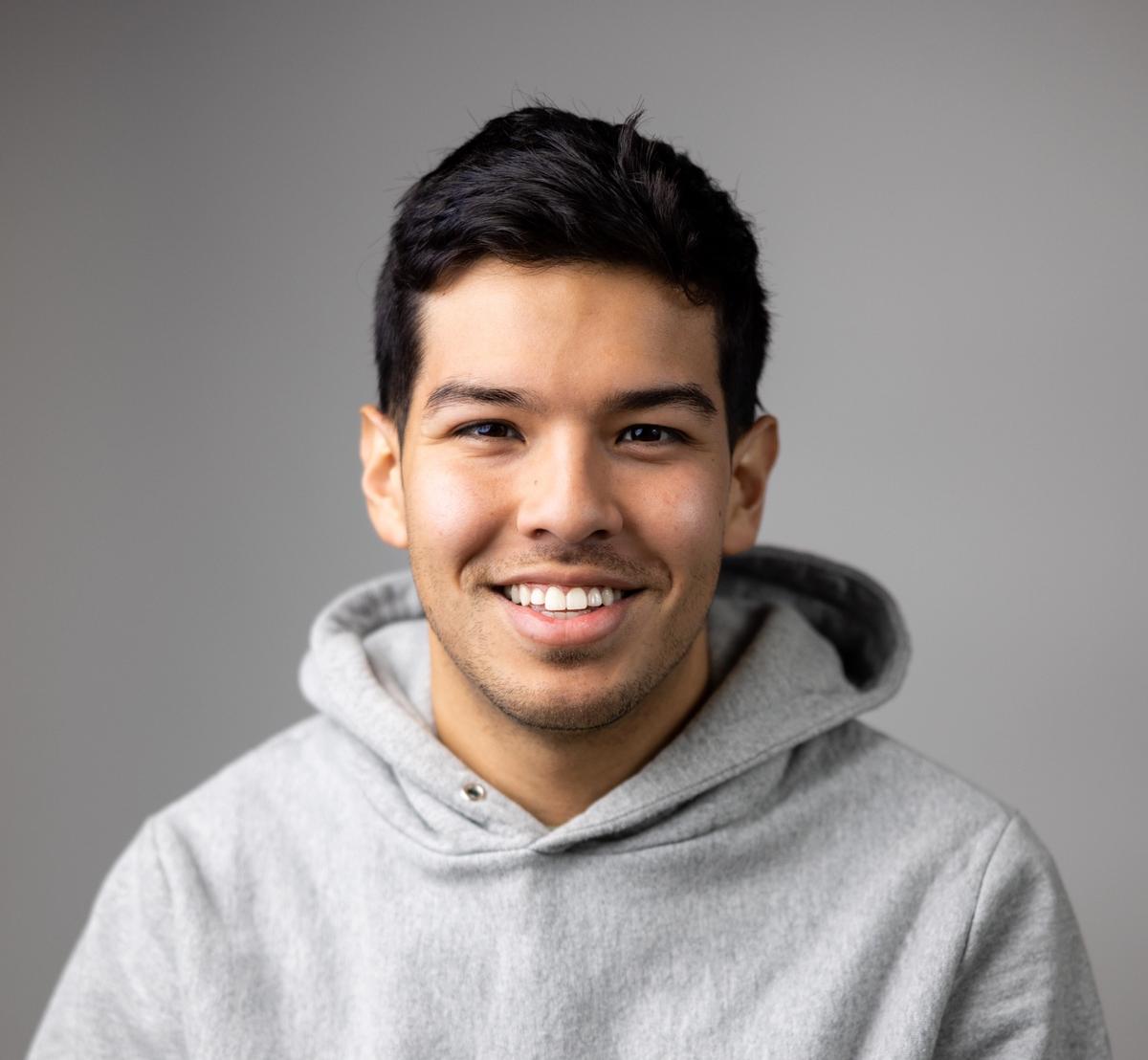
Chris Chavez
Chris Chavez launched CITIUS MAG in 2016 as a passion project while working full-time for Sports Illustrated. He covered the 2016 Olympics in Rio de Janeiro and grew his humble blog into a multi-pronged media company. He completed all six World Marathon Majors and on Feb. 15th, 2025 finally broke five minutes for the mile.
